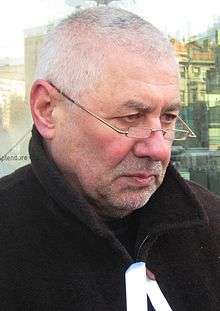Gleb Pavlovsky
Gleb Olegovich Pavlovsky (Russian: Глеб Оле́гович Павло́вский; born 5 March 1951) is a Russian political scientist (he describes himself as a "political technologist"). During the Soviet era, he was prosecuted as a dissident.[1]
Gleb Olegovich Pavlovsky | |
|---|---|
Глеб Оле́гович Павло́вский | |
 Gleb Pavlovsky during March 2012 rally | |
| Born | Gleb Olegovich Pavlovsky 5 March 1951 |
| Citizenship | |
| Alma mater | Odessa University |
| Occupation | Journalist, political scientist |
| Known for | Human rights activism |
| Awards | Order "For Merit to the Fatherland" |
Pavlovsky is president of the Foundation for Effective Politics (FEP).[2] In 1997, he helped create "Russian Journal", one of Russia's oldest websites.[3] Pavlovsky and FEP organized and financed many early websites on the Runet, including Lenta.Ru.
From 2005 to 2008, Pavlovsky hosted the weekly television news commentary "Real Politics", which was shown on NTV Russia at 10:00 P.M. on Saturdays.
Before Perestroika
Pavlovsky was born on 5 March 1951 in Odessa in a family of engineers. From 1968 to 1973, he studied history at Odessa University and his first published work was in a university newspaper and was forbidden by the Politburo because of its alleged "anarchistic and left- extremist mood".
At the age of 21, Pavlovsky and friends organized a political commune "Субъект Исторической Деятельности" (Subject of Historical Action), inspired by the spirit of the 68th and its ideal of intellectual Marxism. At this stage, Pavlovsky began to increase his links to the dissident movement in Odessa. In the 1970s, he went to Moscow to meet fellow dissidents: Mihail Gefter, Genrih Batishev, Grigory Pomerants and other associates.
As the 70s went on, Pavlovsky had cemented his place in Moscow's dissident movement and began publishing an underground newspaper entitled "Poiski", all while avoiding KGB interference. In 1982, he was arrested for anti-Soviet activity and sentenced for 3 years in exile in the Komi Republic.[4] There, he made a living as a house painter and stoker.
Media
1991—1992 — vice chair of "Kommersant" publishing house.
1994—1995 — editor-en-chief quarterly published magazine "Переделы Власти"
1995—1996 — founder and co-editor of "Sreda" magazine.
1995—2009 — co-creator of Foundation of Effective Politics (Russian: «Фонд эффективной политики», along with Maxim Meyer and Marat Gelman).
1997—co-founder and editor-en-chief of internet magazine "Russian journal". May be the first Russian blog.
Fiona Hill writes that Pavlovsky was a Kremlin adviser and political strategist who worked closely with Vladimir Putin during Putin’s first tenure as president and prime minister. Pavlovsky was fired from this position in the spring of 2011.[5][6]
2005 — co-founder and editor of "Europe" publishing house.
April 2012 — founder and editor-en chief of gefter.ru blog about historical science and society. Internet portal named after a master of Gleb Pavlovsky – Mihail Gefter (1918–1995) – a great Russian and Soviet historian and public figure.
Notes
- Gleb Pavlovsky biography, Russian Journal
- FEP Archived 1 March 2005 at the Wayback Machine
- "About the Russian Journal" Archived 17 July 2011 at the Wayback Machine
- "The trial of Gleb Pavlovsky, 18 August 1982" A Chronicle of Current Events (65.1), 31 December 1982.
- Parfitt, Tom (July 2014). "Gleb Pavlovsky: Putin's World Outlook. Interview by Tom Parfitt. What are the roots of Putin's ideological worldview?". New Left Review. Retrieved 13 February 2020.
- Fiona Hill and Clifford G. Gaddy, Brookings Institution Press. (2013), p. 25.
External links
| Wikiquote has quotations related to: Gleb Pavlovsky |